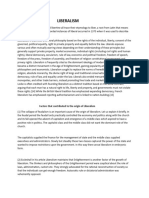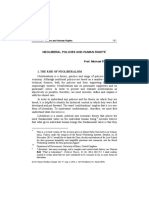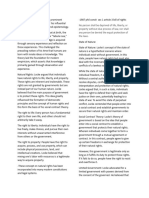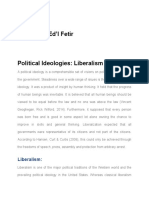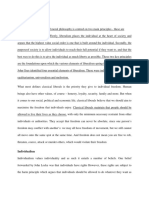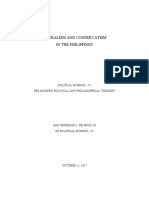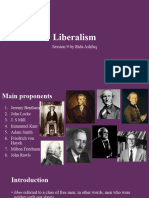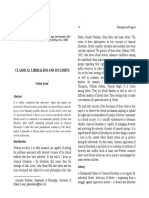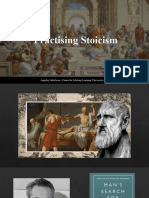Classical Liberalism Notes
Individual Liberty and Autonomy
Individual liberty and autonomy stand as central tenets within classical liberal thought,
emphasizing the paramount importance of personal freedom and self-determination.
Classical liberalism asserts that individuals possess inherent rights and freedoms by virtue of
their humanity. These rights, described as intrinsic, inalienable, and universal, are believed to
exist independently of the state or any form of governmental authority. Central among these
rights is personal freedom—the liberty to act, speak, and live without undue interference,
provided such actions do not harm or infringe upon the rights of others. This conception of
liberty is primarily understood in negative terms, referred to as negative freedom, meaning
freedom from external constraints or coercion.
The philosophical basis of individual liberty in classical liberalism rests significantly on the
optimistic view of human nature, where humans are considered rational, capable, and inherently
autonomous. John Locke, one of the foundational thinkers of classical liberalism, famously
argued that individuals are rational agents capable of governing their own lives through reason.
Locke proposed that rationality is intrinsic to human nature, thus justifying the individual's
autonomy in personal decision-making. Consequently, individuals are best positioned to make
decisions concerning their own lives, happiness, and well-being.
Classical liberals strongly advocate that individuals should not be subordinated to collective
entities, such as the state, religious institutions, or social groups, asserting that such
subordination undermines individual autonomy. They stress that the individual, rather than any
collective body, should be the primary unit of moral and political consideration. In essence,
classical liberals argue that personal autonomy is fundamental to a meaningful and flourishing
life, facilitating innovation, self-improvement, and progress.
Moreover, individual autonomy extends into economic freedom. Classical liberals advocate for
laissez-faire capitalism, asserting that economic liberty—the freedom to engage in trade, own
property, and accumulate wealth without government interference—is vital for autonomy. Such
economic independence, classical liberals believe, empowers individuals, allowing them greater
control over their destinies, fostering responsibility, innovation, and personal development.
Natural Rights and the Social Contract
The doctrine of natural rights is foundational to classical liberal thought, asserting that
individuals inherently possess certain fundamental rights by virtue of being human, independent
of any government or societal recognition. These rights, often defined as the right to life, liberty,
and property, were articulated prominently by John Locke, whose philosophy profoundly
influenced subsequent liberal thought and political developments.
�Natural rights are conceived as universal and inalienable—applicable to all individuals without
distinction. They exist in what classical liberals term a 'state of nature,' a hypothetical pre-
political condition described by Locke as peaceful and governed by rational principles, or natural
laws, discoverable through reason. Despite the intrinsic rationality and peacefulness of this
state, Locke recognized that a lack of formal authority might lead to disputes, especially
concerning property rights. Consequently, to address these uncertainties and potential conflicts,
individuals voluntarily enter into a social contract.
The social contract is a crucial classical liberal concept articulating how legitimate government
authority arises. It theorizes that individuals consensually form societies and establish
governments to better protect their natural rights. Under the terms of the social contract,
individuals agree to surrender a limited scope of their freedoms and powers to the state,
specifically to ensure protection and preservation of their remaining rights. Locke envisioned
government as a fiduciary or trust-based institution, where rulers are entrusted by the governed
to protect individual rights and are bound by the constraints of consent and law.
Locke’s notion of the social contract emphasizes the principle of government by consent,
underscoring that governmental legitimacy derives directly from the governed. If a government
fails to protect natural rights or breaches the conditions of the social contract, individuals retain
the right of resistance and revolution—justifying rebellion or governmental change as a
legitimate recourse. This idea significantly influenced historical liberal revolutions, notably the
American Revolution (1776), wherein the Declaration of Independence explicitly invoked
Locke’s language concerning natural rights and consent-based governance.
Moreover, the concept of the social contract reinforces the classical liberal advocacy for limited
government, a government constrained strictly to the protection of natural rights rather than
expansive intervention in personal or economic affairs. This limited government reflects
classical liberals' enduring concern about potential abuses of power and the need for strict
safeguards against tyranny.
In sum, classical liberalism's emphasis on natural rights and the social contract articulates a
clear, rational justification for limited government based on consent and accountability, framing
political authority as legitimate only when safeguarding individual autonomy and intrinsic
freedoms.
Homework task:
Imagine a society without a social contract (i.e. a primitive society, before the emergence of any
organized society). Write a short scenario describing potential problems and conflicts. Then
explain how a Lockean social contract could address these issues. (100-150 words)






